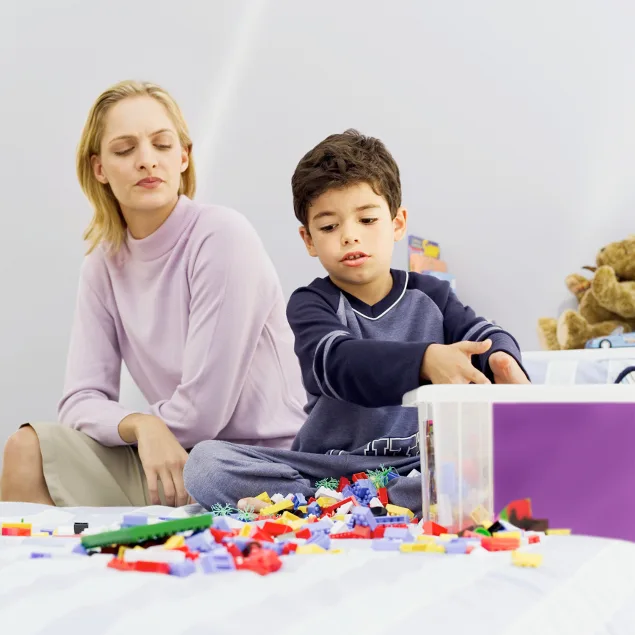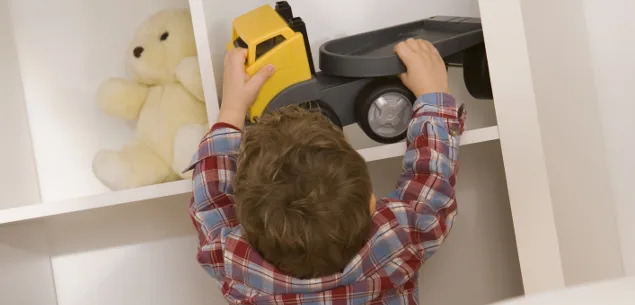Kids’ chaotic and messy bedrooms are often the bane of our lives and it doesn’t seem to matter how much we bellow “tidy that room!”, they still end up strewn with clothes and toys.
Not only is it impossible to find anything in the clutter, but mess can have other detrimental effects, says personal organiser and decluttering expert Michelle Denholm.
“Clutter in a child’s room will affect their energy levels, sleeping patterns and the way they feel about their room,” says Michelle. “While adults may prefer a bedroom for total relaxation, children love it to be a fun, happy place.
But at the end of the day they also want it to be restful and safe. A room that resembles a pigsty is neither fun nor restful.”
The art of being organised and tidy can be learned even if you’re not naturally that way inclined, says Michelle, and the sooner you start teaching your children, the better. “When you practise something a lot, it becomes a habit.”
To help your kids control their clutter, start by giving their room a thorough going-over. Organise it so it’s easier for them to keep tidy.
Set up systems that will help them to keep everything in its place and encourage them to keep it clean. Here are some simple ideas of how to do this.
Sorting out your child’s room:
Set aside a decent amount of time to do this properly – don’t just allow half an hour.
Divide the room into zones, for example a zone for sleeping, another one for playing and another for housing clothes. “The trick is to locate everything needed for that activity within that zone,” says Michelle. “Be careful the room isn’t set up with too many zones though, as you will be defeating the purpose of having a restful yet functional room.”
Work on one area at a time and fully complete it before moving to another zone.
Purge anything that’s old, broken or no longer used. Get tough when it comes to throwing things out. If toys, books and clothes are still wearable or in good working order but your child has outgrown them, put them in a box to be given away to a charity.
Sort like with like. Categorise your child’s play stuff, putting all their cuddly toys together and likewise their games, dolls, art and craft supplies and puzzles.
Find a home for everything. Invest in clear plastic containers and label them. If your child is too young to read labels, take a photo of the kind of item that goes in each container and stick it on the box.
Don’t forget about the space under their bed. Boxes that can easily slide out, or ones with wheels that can be rolled out, are useful for storing everything from shoes to art supplies.
Shelves that can house storage boxes are a great idea but make sure they’re attached to the wall. A free-standing shelving unit may topple over if a small child tries to climb up it to get something off the top shelf.
Make sure there’s a basket or container for dirty washing.
Put as much away out of sight as possible. If your child likes to have things on display, allocate one surface as a display area and have a theme for the items they can leave out, for example matchbox cars, snow globes or mementos from holidays. Then change the display regularly, just like a museum or gallery, so they can show off all of their most treasured belongings, just not all at once.
Teach them not to get new toys out until they’ve put away the ones they were playing with. For example, Thomas the Tank Engine can’t see the light of day until every last bit of Lego has been put back in its container.

Keeping it tidy:
Once the room is organised and there’s a place for everything, make sure your child gets in the habit of putting things away.
Have a daily bedroom blitz. Factor five minutes into their bedtime routine for them to tidy up their room. Try to make it fun – time them and see if they can cut their time from the previous day.
Praise them when their room is organised.
Regularly do a sort-out of their belongings and get rid of items they don’t use. It will only take a short amount of time to keep on top of things.
Think twice before buying them new things. Do they really need it? Do they have room for it? If they don’t have the space, only allow yourself to buy anything new if there’s something else they can get rid of to make room for it.



